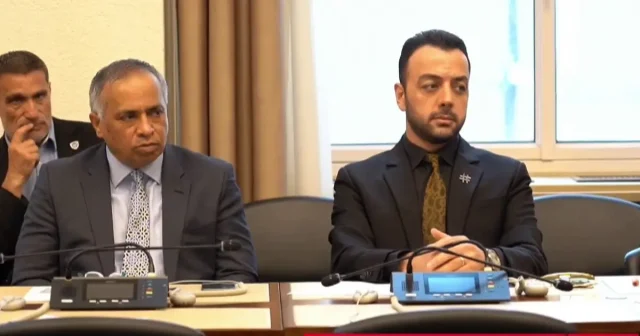At this year’s opening of the Geneva Summit, Iran International’s journalist Pouria Zeraati issued a call to Western leaders, urging them to craft a new policy to back the Iranian people and confront the “terrorism stemming from the Islamic Republic of Iran.”
“In this path, we all have a key role to play…so that the Iranian people’s great revolution, which began in September 2022, will become triumphant – and you, in the Western world, will no longer be threatened by a regime that is against basic human values,” Zeraati said.
Now in its 16th year, the Geneva Summit for Human Rights and Democracy is a leading annual event organized by a coalition of 25 NGOs. It convenes activists globally on the eve of the UN Human Rights Council’s main session to bolster international awareness of human rights issues.
This year, Iran International was named the winner of the 2024 Geneva Summit Courage Award for “fearlessly” uncovering the daily “abuses of the Islamic Republic of Iran.”
Accepting the award alongside Zeraati on Wednesday, is Iran International’s executive editor, Aliasghar Ramezanpoor.
In his speech in Geneva on Tuesday, Ramezanpoor paid tribute to the “brave people of Iran” who he said “support Iran International’s work” by sharing their stories with the network.
“The truth comes from the people of Iran. It is in their voice. And the telling of it comes at great risk to their lives. I applaud their courage, which continues to inspire me and my colleagues in the work we do,” Ramezanpoor said.
Echoing a similar sentiment, Zeraati referenced the Iranian populaces’ persistent anti-regime sentiments.
“In the past two years, the people of Iran have made their demands explicitly clear on the Iranian streets. We need to hear their voices loud and clear,” he said.
Citing the Iranian people’s contributions to the news outlet’s coverage, often serving as citizen journalists, and documenting incidents to share them in the absence of an independent press in Iran, Ramezanpoor said that “their contribution during the Mahsa movement significantly enhanced our coverage of the unrest.”
The Mahsa movement refers to the nationwide anti-regime protests that erupted in Iran after Mahsa Jina Amini died at the hands of the so-called morality police in 2022. In its crackdown on demonstrators, security forces killed at least 550 protesters, including dozens of children.
In that vein, Ramezanpoor and Zeraati emphasized the necessity of keeping international attention focused on the repression of protesters by authorities in Iran, the abuse of political prisoners, and the death penalty.
“Although often powerless to prevent such horrors, the need to talk truth to power has real meaning for people without power,” Ramezanpoor said.
The award is being given to Iran International almost 50 days after Zeraati was stabbed by unknown assailants, outside of his London home.
While British police stated it was premature to determine a motive for the crime, Zeraati’s occupation, along with other threats to Iran International, prompted the involvement of the counterterrorism unit in investigating the attack.
“It was an attack on journalism. It was an attack on freedom of speech and an attack on our core liberal values in the West,” Zeraati stated. “This act of terror to silence and imitate us abroad gives a small glimpse of what the brave people of Iran face on an everyday basis.”
For many years, Iran International has faced threats from the Iranian government. Danger to the network’s employees escalated last year, with domestic security services unable to guarantee employee safety.
The network temporarily relocated its London offices to Washington, D.C.. Before the incident, Iran’s intelligence minister had declared Iran International a terrorist organization, paving the way for all manner of actions against its journalists and broadcasters.
Ramezanpoor, who was convicted by the Iranian regime in absentia for “propaganda against the government,” stated at the summit: “I am happy to report that the ongoing attempts to stop us from broadcasting have not worked – we’re still on the air.”






















